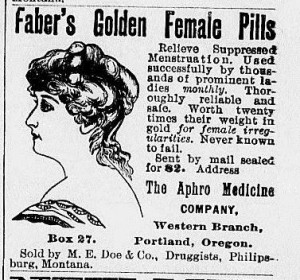
Like their national counterparts, Montana women in the early twentieth century generally considered marriage, childbirth, and motherhood to be natural (and expected) elements of womanhood. At the same time, they did attempt to control their fertility. Conservative attitudes about sex, religious prescriptions against artificial contraception, and isolation and scarcity of medical care all conspired to limit Montana women’s access to birth control. Nevertheless, through female social networks and activism, the women of the state were able exercise a degree of control over reproduction.
Montana women had a variety of reasons for seeking contraception. Many could sympathize with the anonymous ranch wife who, when interviewed, said that she limited her family to two children “because when you had so much work to do, you can’t do all of it. So the children were the minor thing.” Other women, struggling with the hard times that hit Montana farmers and ranchers in the 1920s, sought to delay pregnancy until they were on better financial footing.
Continue reading Family Planning and Companionate Marriage in Early Twentieth-Century Montana